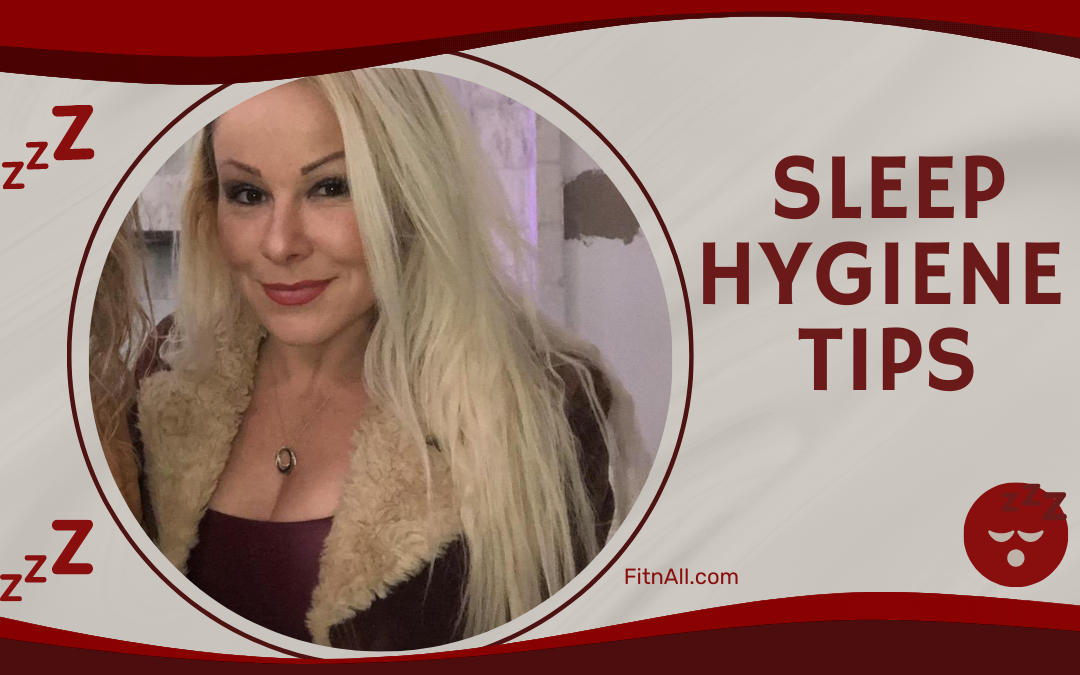Do you feel run-down, sluggish, or drowsy in the morning or throughout the day? If so, you are not alone. Almost half of all Americans say they feel sleepy during the day at least three days out of the week. Severe sleep disorders may require medical intervention. However, most sleep issues can be fixed by adjusting your sleep habits and environment. Read on to learn some sleep hygiene tips to keep you healthy.
Research shows that sleep deprivation, not only, affects your energy levels but also your immune, endocrine, and metabolic function, as well as your hormones (growth hormone, cortisol, thyroid), cognitive function, and emotional well-being. Simultaneously, poor sleep can impede learning and even endanger your life. Most crashes cluster during the overnight hours (midnight to 7:00 AM) and at mid-afternoon (around 3:00 PM). If you are not getting enough sleep or not getting high-quality deep sleep, it’s primordial to make changes now.
Develop a Sleeping Routine
The first sleep hygiene tip to keep you healthy and sleeping throughout the night is to develop a sleeping routine. This is crucial for maintaining overall health and well-being. The body’s circadian rhythm, or internal clock, regulates various physiological processes, including sleep-wake cycles, hormone production, and metabolism. Adhering to a regular sleep schedule helps synchronize these functions, promoting better quality sleep.
A consistent bedtime and wake-up time contribute to a more balanced and energized life, enhancing focus, productivity, and mood throughout the day. Additionally, a stable sleep routine helps prevent sleep disorders and related health issues, ensuring the body and mind are adequately rejuvenated for optimal functioning. Prioritize a healthy sleeping routine by going to bed and waking up at the same time, avoiding long naps or naps after mid-afternoon, and getting natural sunlight for at least 30 minutes a day.
Relax
Another sleep hygiene tip that helps keep you healthy and sleeping through the night is being relaxed. Our bodies were designed to sleep through the night. Poor sleep can be the result of stress or not being internally at peace. Chronic or acute stress has huge detrimental effects such as obstruction of sleep cycles, altered psychological states, increased anxiety and other negative emotions, and physiological dysregulation.
In order to avoid poor sleep, you should incorporate activities that help stabilize the bond between your body, mind, and spirit. Some of the practices that can help are yoga, meditation, mindfulness, deep breathing, prayer, affirmations, progressive muscle relaxation, and visualization. You can also read, dim the lights, eliminate loud noises, and use a warm bath, a massage, or essential oils to help you wind down.
Reduce Your Caffeine Intake
Reduce your caffeine intake after mid-afternoon. Caffeine can build up and take a while to wear off. Keep track of how many caffeinated drinks and foods you consume. Coffee, tea, soda, chocolate, and some supplements contain caffeine. They can interfere with your sleep if you take them later on during the day.
Drinking some caffeine in the morning to energize you or before your workout is understandable. Yet, relying on caffeine to fulfill your tasks throughout the day is not healthy. Besides keeping you up at night, overdoing it with caffeine can cause numerous problems such as anxiety, digestive issues, muscle breakdown, high blood pressure, and rapid heartbeat.
Decrease EMF Exposure
Electromagnetic fields (EMFs) are used to enable modern devices, including microwaves, mobile telecommunications infrastructure and phones, Wi-Fi, and Bluetooth. EMFs emit radiation. They have been linked to adverse health effects, even cancer. EMFs disrupt the nervous system and cell membranes’ permeability which affects sleep and mental health.
Electronics also affect you. Those with bright screens and blue spectrum light, similar to sunlight, trick your brain into thinking it is daytime, disrupting your circadian rhythm. Even if it feels irresistible, you should avoid checking your social media feeds, texts, and emails an hour before bed. Try to eliminate all screens to allow your brain to relax and get ready for sleep.
Your Bed Matters
Another essential sleep hygiene tip is to pay attention to where you sleep. Research shows that when subjects sleep on “comfortable” mattresses, they report a lower body temperature and higher sleep efficiency and percentage of deep sleep than when sleeping in “uncomfortable” mattresses. They also report waking up less.
Your bed, your mattress, and your bed accessories matter. If your mattress is lumpy, bent, or bowed, or has springs sticking out of the fabric, it’s time for a new one. If your bed looks in good condition but you’re waking up with back, shoulder, or hip pain, your mattress might be too firm and putting extra stress on those parts, or too soft and not supporting you enough. One accessory that makes a great difference is a cooling mattress topper. You can get one that contours to your body and even one with cooling gel memory foam.

Exercise
You may have noticed that when you spend a lot of energy throughout the day, you fall asleep faster and sleep deeper. Exercise not only keeps you fitter and healthier but helps lower stress levels. It decompresses the mind, “a cognitive process that is important for naturally transitioning to sleep.” This translates into greater ease in getting enough sleep. Additionally, exercise increases slow-wave sleep. This is the amount of deep sleep you get, which allows your brain and body to reset and recover.
Did you know that exercising regularly can also boost testosterone levels in your body? You may also want to look into Research on Does Sleeping Naked Increase Testosterone levels while you’re at it, and review some additional tips and ways to raise your levels naturally. After a good night’s sleep, you’ll look better and feel better.
Avoid Late Workouts
Even though exercise is pivotal to your health, it may affect sleep when done later in the day. Working out shortly before bed can keep you awake. If you feel that you have difficulty going to sleep, avoid exercising for at least 1 to 2 hours before going to bed. Vigorous exercise pre-bedtime can disrupt the onset of sleep because it creates physiologic excitement by increasing your heart rate.
In addition, exercise increases the release of endorphins. These chemicals give you a feeling of well-being but can keep you in a state of excitement. Exercise also raises your core body temperature, which may make it difficult to fall asleep. It’s believed that the decline in your body temperature helps to facilitate sleepiness, making the ideal temperature for sleeping about 65 degrees.
Be Mindful of Sleep Disruptors
- Large meals: Avoid eating big meals before bedtime because they interfere with normal sleep patterns. Typically after a big meal, your body devotes energy to digestion, which takes several hours. Even though digestion slows down during sleep, sleep processes get interrupted as your body is using the energy it needs toward recovery for those tasks. Besides disrupting your sleep, overeating at night may induce and exacerbate acid reflux and indigestion and increase body temperature.
- Alcohol, prescribed and non-prescribed drugs
- Blue lights
- EMFs
- Pain
- Conventional mattresses
- Caffeine and nicotine
- Dysregulated emotions
- Mental health disorders
- Not being at peace
- Learn more about the most significant sleep disruptors and how to deal with them
CBD & THC
CBD and THC have the same molecular structure and are chemically similar to your body’s endocannabinoid system, allowing them to interact with your cannabinoid receptors. They can help fight pain, inflammation, stress, immune dysfunction, and sleep disorders.
However, CBD and THC molecular structures are arranged differently. CBD can be extracted from hemp or cannabis which come from the Cannabis sativa plant. CBD contains less than 0.3% THC and doesn’t produce the “high” sensation associated with cannabis. It can be found in gels, gummies, oils, supplements, extracts, and balms.
On the other hand, THC is the main psychoactive in cannabis, which can get people “high.” It can be smoked or found in oils, edibles, tinctures, capsules, and extracts. If you are looking for high-quality CBD and THC products, you can click here to explore just one of the options out there when it comes to online dispensaries.
If you are looking for a stronger form of THC, maybe something up to 99% THC, you may benefit from THC diamonds. These diamonds are ideal for people who use medicinal marijuana to manage their chronic pain, appetite loss, and other health conditions. Check out https://lowpricebud.co/are-thc-diamonds-worth-it/ for great results.
Summary
In the quest for a deep and rejuvenating night’s sleep, remember to reduce your caffeine intake and other sleep disruptors, stay active, and be mindful of your sleeping environment, and stress levels. The sleep hygiene tips mentioned above can make a real difference and allow you to get enough sleep and optimize your health.
To a Fitter Healthier You,
The Fitness Wellness Mentor



